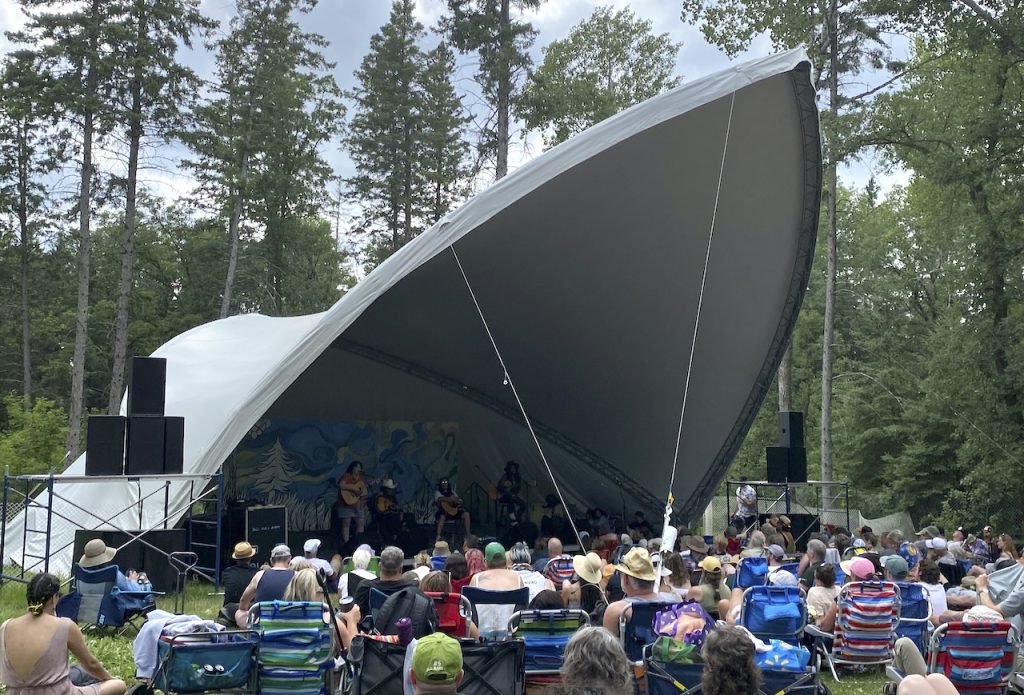
Transcendent (adjective) [tran(t)-ˈsen-dənt]: exceeding usual limits; extending or lying beyond the limits of ordinary experience; being beyond comprehension; a spiritual or religious state, or a condition of moving beyond physical needs and realities
****
Every year at the Winnipeg Folk Festival, it happens at least once – I have a transcendent experience. It usually happens at one of the smaller stages, tucked away under the trees, while I’m listening to an intimate concert with a singer-songwriter. It’s a combination of things that align to bring together this exquisite moment – the cotton-ball clouds in the gentle blue sky, the towering pine trees, the poetry and emotion woven through the lyrics, the notes of the guitar, the tenderness of a receptive audience, the sun on my face.
Suddenly, I feel my heart soften and expand in my chest as though it can simultaneously blend into and hold the entire universe. I become both expansive and small – a tiny part of a big world and also bigger than I’ve ever been. As my eyes fill with tears, I look around me and know that I am connected to everyone I see, connected to the trees around me, connected to the music, and connected to myself. I am fully embodied, fully present, and fully alive. Any anxiety or self-consciousness I held just moments before dissolves in this moment of tenderness, connectedness and expansiveness. It’s blissful and as close to perfect as any moment can be.
The moment never lasts very long – soon I land back into the ordinariness of life and my mind starts to wander – but it stays with me throughout the day, and I can bring some of it back days and even weeks after it happens. Even now, I can close my eyes and reach back into my memory to touch that moment and remember the way I felt when it happened.
In his study of awe, Dacher Keltner gathered stories from people in 26 countries and distilled the stories into what he calls the “eight wonders of life”. People find awe, he says, in moral beauty (people’s kindness, courage, and ability to overcome obstacles), nature, collective movement, music, visual design, spirituality, big ideas, and the beginning of life and its end. Perhaps that’s why there is such a strong likelihood that it will happen for me during my annual pilgrimage to the folk festival – because that moment always combines so many of the things on the list.
Awe, Keltner says, is transformative. “It’s hard to find something that is better for your body and mind than experiencing a bit of awe. Studies where people look up into the trees or take in vast views or think about somebody who is morally inspiring find that brief experiences of awe calm the stress response and make a person feel more connected and less lonely. Awe has been seen to reduce depression, reduce PTSD symptoms in veterans, and is also good for cardiovascular health and the immune system.” (Listen to Dacher Keltner talk about awe on this podcast.)
In studying the science of awe, Keltner’s team found that there’s a certain kind of tear that happens during an experience of awe (like the tears that always fill my eyes when I have my transcendent moment at the folk fest) that’s produced by the lacrimal gland which is activated by the parasympathetic autonomic nervous system. Instead of activating fight or flight physiology, it activates calmness and connection. In other words, awe soothes and calms our bodies and gives us that feeling of oneness that I always feel with other members of the audience.
This past year, while I was traveling, I was lucky enough to have many experiences of awe, like when I swam in cenotes in Mexico, or took a train into the snow-covered Alps in Switzerland. I know that those moments helped to heal and transform me. I feel more at peace, more grounded, more in touch with myself, and more able to live with the liminality of life. I know that I am less reactive, less activated by the wounds that were once easily triggered, and less burdened by stress.
Of course it’s not only the awe moments that changed me (I’ve also been doing a lot of somatic and therapeutic healing work over the years), but I have no doubt that they mattered. I have now become much more intentional about seeking out awe moments, so that I can tap into some of what I experience while sitting under the trees listening to music at the festival. As Keltner teaches, I find ways of experiencing “everyday awe” by bringing more of the eight wonders into my life as regularly as I can. This morning I experienced awe watching a swarm of ants on the sidewalk.
It can seem frivolous, in a world that feels more and more chaotic and unjust every moment, in which political divides and climate change are becoming more and more palpable in our everyday lives, to go out in search of awe, and yet I believe that this is a crucial part of what makes us able to cope with and respond to the many challenges in our lives. Awe makes us more resilient and more grounded in the wobbliness of liminality. It connects us with each other, ourselves and the earth. It is the opposite of frivolous – it is essential.
Awe is one of the things we’ll be talking about in A Full-Bodied Life. We’ll also talk about embodiment, empowerment, liberation, love, joy, and connection. I am looking forward to the conversations we’ll have and I hope you join us!
